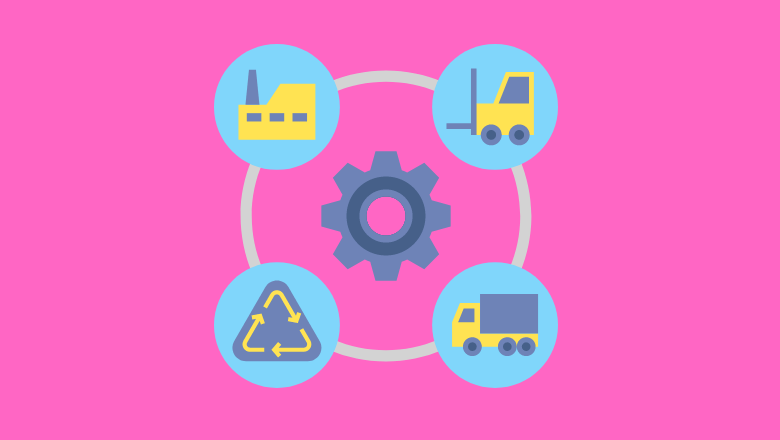As a Supply Chain Software Engineer, you’ll be responsible for developing and implementing software solutions to optimize your company’s supply chain.
As businesses continue to grow and expand globally, the importance of a well-functioning supply chain becomes increasingly crucial. And with the rise of technology, supply chain software has become vital in ensuring operations run smoothly and efficiently.
As a result, supply chain software engineers are in high demand.
In this article, we explore the following:
- What a supply chain software engineer does
- The importance of supply chain software
- And why software companies need a supply chain.
We will also discuss the job opportunities available for supply chain software engineers, including developer jobs, management jobs, and entry-level positions.
What is Supply Chain Software Engineering?
A supply chain software engineer is a specialized software developer who creates software solutions for businesses to manage their supply chain operations.
They design, develop, and implement software that can be used to streamline and optimize supply chain processes, including inventory management, order processing, logistics, and transportation.
Supply chain software engineers are responsible for understanding the complexities of the supply chain and developing software that can integrate with existing systems.
They use their computer science and engineering knowledge to design and build software applications to help businesses automate processes and increase efficiency.
What Does Supply Chain Software Do?

It is software designed explicitly for supply chain management. It helps businesses manage their supply chain processes by providing real-time data and insights into inventory levels, order processing, and logistics.
Some of the key features of supply chain software include:
Inventory management
Supply chain software helps businesses manage inventory levels by providing real-time stock, demand, and supply data. This information lets companies decide when to reorder and how much to order.
Order processing
Supply chain software helps businesses manage their orders by providing real-time data on order status, delivery dates, and customer information. This information allows companies to ensure that orders are processed and delivered on time.
Logistics management
Supply chain software helps businesses manage logistics by providing real-time data on shipping status, delivery times, and transportation costs. This information allows companies to optimize logistics processes to reduce costs and improve delivery times.
Supplier management
Supply chain software helps businesses manage suppliers by providing real-time data on supplier performance, quality control, and compliance. This information allows companies to identify and address issues with suppliers to ensure that they meet quality and compliance standards.
Do Software Companies Have a Supply Chain?

Software companies have a supply chain, just like any other business. The supply chain for a software company includes the procurement of hardware, software, and services and the development and delivery of software products.
Software companies also have a complex supply chain to deliver their products to customers. Content delivery networks (CDNs) and servers ensure customers receive software quickly and reliably.
Software companies must consider the importance of supply chain management. Managing supply chains efficiently can reduce costs, improve efficiency, and increase customer satisfaction.
Job Opportunities in Supply Chain Software Engineering
Several job opportunities are available in supply chain software engineering, including developer jobs, management jobs, and entry-level positions.
Developer Jobs
Supply chain software developers are responsible for designing, developing, and implementing software solutions for the supply chain management. They use their computer science and engineering knowledge to build software applications to help businesses automate processes and increase efficiency.
Management Jobs
These positions are responsible for overseeing the development and implementation of software solutions for the supply chain management.
Entry-Level Positions

Computer science, software engineering, and related fields are usually required for these positions.
Entry-level professionals will work under the guidance of experienced software engineers, gaining valuable experience in coding, testing, and debugging software programs.
As entry-level professionals progress, they may take on more challenging and complex projects. A supply chain software engineer may also specialize in a specific area, such as data analytics, machine learning, or cloud computing.
As they gain more experience and knowledge, they may also be allowed to mentor and train new hires.
Management Positions
Experienced supply chain software engineers who demonstrate strong leadership and management skills may have the opportunity to advance into management positions.
These positions include software development manager, software engineering manager, and technical project manager.
Professionals oversee the software development process in these roles from start to finish. They work closely with business leaders to determine requirements and create plans aligning with the organization’s goals and objectives.
In addition, they manage software engineers, providing guidance and support to ensure projects are completed on time.
Management positions in supply chain software engineering require strong technical and analytical skills and excellent communication and leadership abilities.
Professionals in these roles must be able to motivate and inspire their teams to achieve their best work while staying up-to-date on the latest trends and technologies in software engineering.
Jobs in Supply Chain Software Engineering

There are a variety of job opportunities available in the field of supply chain software engineering.
Some of the most common job titles include software engineer, software developer, software architect, software development manager, technical project manager, and data analyst.
Software Engineer
Software engineers design and develop software programs to manage supply chain operations. They work closely with business leaders to understand the organization’s needs and create software solutions that meet them. They write code, test software programs, and debug issues.
Software Developer
Software developers are responsible for writing, testing, and debugging software programs. They work closely with software engineers to create solutions that meet the organization’s needs.
They are also responsible for ensuring that software programs are compatible with different operating systems and devices.
Software Architect
Software architects are responsible for designing and planning the software architecture of supply chain systems.
They work closely with software engineers and business leaders to determine the best approach to software development and create project plans that align with the organization’s overall goals and objectives.
Software Development Managers
Software development managers oversee the software development process from start to finish.
They work closely with business leaders to determine requirements and create plans aligning with the organization’s goals and objectives.
Additionally, they provide guidance and support to software engineers to ensure projects are completed on time and within budget.
Technical Project Manager
Technical project managers oversee the technical aspects of software development projects. They work closely with software engineers and business leaders to ensure projects are completed on time and within budget.
Data Analyst
Data analysts use data analytics tools to gather and analyze data related to supply chain operations. They work closely with business leaders to identify areas for improvement and optimization and then create reports and visualizations to communicate their findings.
FAQs

Q: What does a supply chain software engineer do?
A: A supply chain software engineer designs, develops, and maintains software applications to manage the various aspects of supply chain operations.
They work to create software solutions that can help businesses optimize their supply chain processes, reduce costs, increase efficiency, and improve overall performance.
They also work with other professionals in the supply chain field to understand the needs and challenges of the industry and to design solutions that meet those needs.
Q: What skills are required for a supply chain software engineering career?
A: A supply chain software engineering career requires technical and business skills.
Skills include programming languages like Java, Python, and Ruby, database management, and web development.
Business skills include understanding supply chain operations and processes, project management, and communication skills.
Attention to detail, problem-solving ability, and the ability to work in a team are also essential skills for this career.
Q: What kind of companies employ supply chain and software engineers?
A: There are a variety of companies that hire supply chain software engineers, including logistics companies, manufacturers, and retailers.
Some supply chain software engineers also work in consulting firms, providing advice and developing solutions for various clients.
Q: Are there entry-level positions available in supply chain software engineering?
A: There are entry-level positions in supply chain software engineering, including roles such as software engineer intern, junior software engineer, and software developer.
Typically, these positions require a bachelor’s degree in computer science or a related field and some programming experience. Entry-level positions can be a great way to gain experience and start a career in this field.
Q: Are software engineers in short supply?
A: There is currently a high demand for software engineers in general, including those specializing in supply chain software engineering.
This demand is driven by the increasing reliance on technology in supply chain operations, the growth of e-commerce, and the need for more efficient and streamlined logistics and fulfillment processes.
As a result, software engineers in this field are in high demand and can expect to receive competitive salaries and benefits.
As a Supply Chain CTO, you oversee the technology solutions that enable your organization to meet its growth objectives.
You have a lot on your plate, from people management to process management and technology.
In addition to the common problems that come with the job, there are a few uncommon issues that you may face.

Lack of Cross-Functional Collaboration
One of the biggest challenges facing Supply Chain CTOs is the need for cross-functional collaboration.
Business units often operate in silos, leading to communication breakdowns and misaligned priorities.
Collaborative and communicative environments are essential for solving this problem.
A shared understanding of each business unit’s goals and objectives can help achieve this.
Resistance to Change
Resistance to change is another common problem that Supply Chain CTOs face.
Employees may resist new technologies or processes, fearing that machines will replace them or lose their jobs.
Creating a continuous improvement and learning culture is essential to overcoming this challenge.
Training and development programs, showcasing the benefits of new technologies, and fostering a culture of experimentation and innovation can help.
Legacy Systems
Legacy systems are another problem that Supply Chain CTOs face. Many organizations need updated technology systems that are difficult to maintain and upgrade.
These systems may also be incompatible with new technologies, limiting the organization’s ability to innovate.
Identify areas where legacy systems can be replaced or upgraded and thoroughly analyze the organization’s technology infrastructure.
Cybersecurity Risks
Cybersecurity risks are a growing concern for organizations of all sizes, and Supply Chain CTOs are no exception.
Cyber threats are rising, so a robust cybersecurity strategy is essential.
Regular software updates, strong passwords and employee training on identifying and responding to cyber threats are best practices.
Recruiting Top Talent
Supply Chain CTOs face a long-term challenge in recruiting top talent. There is fierce competition for software engineers.
Furthermore, to attract and retain the best talent, it’s essential to create a culture of innovation, invest in employee development programs, and offer competitive compensation packages.
Wrapping up
Supply chain software engineering is a critical field that plays an essential role in the success of organizations across various industries.
As organizations embrace technology and data analytics to improve their supply chain operations, the demand for skilled software engineers will likely grow.
Moreover, as a Supply software engineer, you face various challenges that require creative and innovative solutions.
By fostering a culture of collaboration, continuous learning, and innovation and investing in the right technologies and people, you can overcome these challenges and lead your organization to success.







